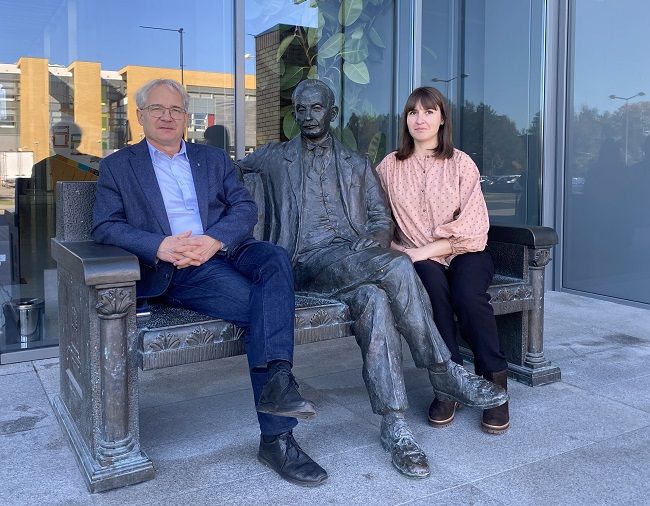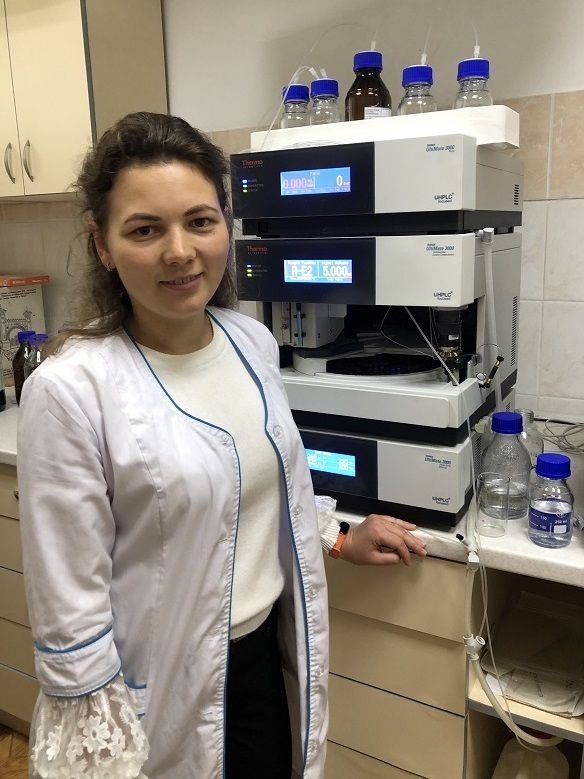22 students and entry-level researchers will now continue their studies and research projects in Poland. We have selected the winners of a programme targeted at students and PhD students looking for refuge in Poland, which is funded from the EEA and Norway Grants.
The scholarships will go to fifteen female and seven male entry-level researchers. Before the war, most studied or did their research in Kyiv and Kharkiv. They will now continue their studies, write their MA theses and work on their PhD dissertations in cities such as Warsaw, Poznań, Lublin, Rzeszów, Szczecin and Olsztyn.
 Przemysław Makarowicz and Olga Zaitseva, private photo
The largest group among the recent winners is interested in the past: history, archaeology, ethnology and cultural anthropology (HS3 panel). Olga Zaitseva is an archaeologist from the Borys Hrinchenko Kyiv University. Before the war, she was working on a PhD dissertation about the evolution of pottery in the Cucuteni-Trypillia cultural complex at the turn of the 5th and 4th centuries BCE. She previously took part in an excavation carried out within the framework of an NCN project entitled “Continuity and change. Barrow culture communities in the Upper Dniester River Basin in the 3rd and 2nd millennia BCE in the light of multidisciplinary research”, led by Professor Przemysław Makarowicz from the Adam Mickiewicz University in Poznań. “Last year, we carried out non-invasive research and excavations at a barrow burial site in Volitsa, in the Ternopil oblast”, Makarowicz explains. When the war broke out, his team drove to the Ukrainian-Romanian border to collect Olga Zaitseva and her children. Thanks to the NCN scholarship, Zaitseva will now be able to continue working on her PhD and study cutting-edge non-invasive investigation techniques, which she will later introduce at her home institution. The Faculty of Archaeology of the Adam Mickiewicz University is equipped with advanced non-invasive research devices, such as magnetometers, a georadar, drones, a total station and a lab with a set of microscopes. Training in the use of this equipment is provided by Professor Makarowicz’s team. “Non-invasive methods are still rarely used in Ukrainian archaeology, so I hope to draw on what I learn here to promote their use in archaeological research in my country”, says Zaitseva. She stays in touch with her home university. “We hold regular online meetings to discuss ideas and create future research and teaching strategies for our faculty”, she adds.
Przemysław Makarowicz and Olga Zaitseva, private photo
The largest group among the recent winners is interested in the past: history, archaeology, ethnology and cultural anthropology (HS3 panel). Olga Zaitseva is an archaeologist from the Borys Hrinchenko Kyiv University. Before the war, she was working on a PhD dissertation about the evolution of pottery in the Cucuteni-Trypillia cultural complex at the turn of the 5th and 4th centuries BCE. She previously took part in an excavation carried out within the framework of an NCN project entitled “Continuity and change. Barrow culture communities in the Upper Dniester River Basin in the 3rd and 2nd millennia BCE in the light of multidisciplinary research”, led by Professor Przemysław Makarowicz from the Adam Mickiewicz University in Poznań. “Last year, we carried out non-invasive research and excavations at a barrow burial site in Volitsa, in the Ternopil oblast”, Makarowicz explains. When the war broke out, his team drove to the Ukrainian-Romanian border to collect Olga Zaitseva and her children. Thanks to the NCN scholarship, Zaitseva will now be able to continue working on her PhD and study cutting-edge non-invasive investigation techniques, which she will later introduce at her home institution. The Faculty of Archaeology of the Adam Mickiewicz University is equipped with advanced non-invasive research devices, such as magnetometers, a georadar, drones, a total station and a lab with a set of microscopes. Training in the use of this equipment is provided by Professor Makarowicz’s team. “Non-invasive methods are still rarely used in Ukrainian archaeology, so I hope to draw on what I learn here to promote their use in archaeological research in my country”, says Zaitseva. She stays in touch with her home university. “We hold regular online meetings to discuss ideas and create future research and teaching strategies for our faculty”, she adds.
Iryna Miedviedieva, private photo
Before the war, Iryna Miedviedieva worked at the Institute of Carpathian Ecology in Lviv, writing a PhD dissertation about the parasites that live on spruce trees. At the same time, she was involved in a variety of environmental projects and educational campaigns in the field of bird conservation. She is a birdwatcher focused on wetland ecosystems, as well as a professional nature photographer. “Her activities take on a special importance in an era that has witnessed a mass extinction of species due to environmental changes fuelled by growing human population pressure”, says Professor Ewa Węgrzyn from the University of Rzeszów. In June, Miedviedieva completed an unpaid internship with a team of ornithologists led by Węgrzyn, during which she took part in lab and field work. “Thanks to the team’s experience, I can learn about different research methods used to study bird song and plumage colouring. I will carry these skills over to my future research on Ukrainian avian fauna”, says the winner of the NCN scholarship.
The young researcher also made a lot of connections with Ukrainian zoologists, which allowed the team at the University of Rzeszów to collect updated information. “We are working with Iryna on a joint research paper devoted to the impact of the Russian aggression on the precious Ukrainian fauna, which includes many rare and protected animal species”, explains Professor Węgrzyn. In winter, Miedviedieva will join the Polish team in another bird research project in the field. “We hope this will lead to more joint publications”, adds the research project advisor.
Besides all this, Miedviedieva continues working on her PhD dissertation about the parasites of the spruce tree. “I had collected my data in Ukraine before the war broke out and before I moved to Poland”, she says. In her free time, she is also working on an atlas of birds living in the area around Rzeszów.
 Olga Dushna, private photo
Olga Dushna will divide her time between the University of Warsaw and her home institution, the Ivan Franko National University of Lviv. In Warsaw, she will do research under the mentorship of Professor Ewa Bulska, Director of the Biological and Chemical Research Centre. The two universities, Polish and Ukrainian, have already worked together for a long time. In July, invited by Professor Bulska, Dushna attended a summer school in analytical chemistry, metrology and accreditation in Chęciny. She will now take part in a pilot study entitled The diagnosis of SARS-CoV-2 using the chemical analysis of dried blood spots by means of the LA-ICM-MS technique. “As a chemical scientist, I want to learn new sampling methods, such as dried spot sampling and LA-ICP-MS analysis. As a researcher, I wish to contribute to science, especially medicine, and in particular to the advancement of SARS-CoV-2 diagnostics”, says Dushna.
Olga Dushna, private photo
Olga Dushna will divide her time between the University of Warsaw and her home institution, the Ivan Franko National University of Lviv. In Warsaw, she will do research under the mentorship of Professor Ewa Bulska, Director of the Biological and Chemical Research Centre. The two universities, Polish and Ukrainian, have already worked together for a long time. In July, invited by Professor Bulska, Dushna attended a summer school in analytical chemistry, metrology and accreditation in Chęciny. She will now take part in a pilot study entitled The diagnosis of SARS-CoV-2 using the chemical analysis of dried blood spots by means of the LA-ICM-MS technique. “As a chemical scientist, I want to learn new sampling methods, such as dried spot sampling and LA-ICP-MS analysis. As a researcher, I wish to contribute to science, especially medicine, and in particular to the advancement of SARS-CoV-2 diagnostics”, says Dushna.
Scientists suspect that the body’s immune response to SARS-CoV-2 vaccination or infection may alter the metabolism of certain biologically essential elements, such as iron, selenium, zinc, and copper. “We have collected a large set of dried blood spots from antibody screening tests and we want to see how strongly the concentration of these elements in the blood correlates with SARS-CoV-2 antibody levels. To do so, we will use the laser ablation micro-sampling technique”, explains Professor Bulska. Researchers will then turn to advanced statistical tools to determine any correlations between the blood levels of selected elements and SARS-CoV-2 antibodies, i.e. the body’s immune response to the coronavirus. “If we find any such correlations, we might be able to determine a patient’s immune response based on the chemical elements in their blood”, she adds.
The scholarships for Ukrainian students and entry-level researchers are funded from the EEA and Norway Grants under the Bilateral Cooperation Fund. Their total budget is 1.2 million zlotys. The terms and conditions of the programme have been approved by the donors: the programme’s partner, the Research Council of Norway and the Joint Committee for Bilateral Fund (JCBF).
New scholarship winners hail from 14 different universities and research centres. They will be hosted by 16 Polish institutions.
Winners will receive their scholarships for 6 to 12 months. The maximum level of monthly funding candidates could apply for was 5,000 PLN per one student or researcher.
This is not the first NCN initiative targeted at the Ukrainian academic and research community. As many as 111 experienced researchers have already benefited from our previous programmes.
More information:
A scholarship programme for Ukrainian students and young researchers
To find out how the NCN supports Ukrainian researchers, go to our website.

